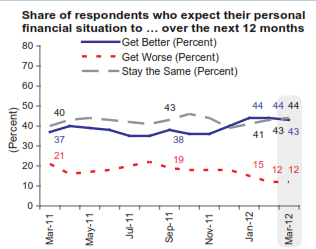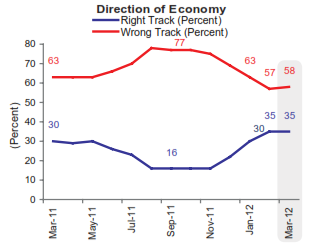Every month Fannie Mae releases a report on the results of its most recent National Housing Survey. The survey, which is conducted by telephone among about 1000 homeowners and renters asks them about 100 questions regarding their attitudes toward homeownership and renting, the economy, and their own financial situation. Occasionally the company does a deeper analysis of some subsets of the data and this month they released a paper titled Renters: Satisfied but Reaching for Homeownership.
The paper is based on responses collected only from renters in surveys conducted in July, August, and September of 2012 - 990 respondents defined as renters and 60 as boarders - living with someone else but not paying rent.
Fannie Mae said that renters overall tend to be satisfied with renting but about half think owning is a more sensible housing choice. Only 17 percent of those responding viewed renting as a negative experience for them or their families while 34 percent said it had been a very positive experience. These numbers are little changed from responses to an identical question asked in 2003, well before the housing crisis.

Fifty-eight percent of renters think people are better off owning for lifestyle reasons, that is if they seek control, privacy, and security or seek to raise a family or invest wisely. However 71 percent give the edge to renting for reasons related to budget, stress, and making the best decisions in today's economy. A bare majority - 51 percent - give the edge to owning when comparing both types of benefits.

Many renters expressed feelings that renting provided them with conveniences and benefits that ownership would not such as living in a convenient location (43 percent), financial flexibility (42 percent), tax benefits (39 percent), easier choice of school districts (29 percent). Apartment renters were more likely than those renting single family houses to give weight to some perceived benefits.
The remainder of Fannie Mae's analysis focused on those 51 percent of respondents who expressed a preference for owning a home. This group, when compared to homeowners, had a significantly higher level of both actual and perceived financial hurdles to homeownership such as few assets, lack of confidence they could get a mortgage, declining income, and financial stresses.
They also have significantly lower household incomes and view this, perhaps unwarrantedly, as a barrier to homeownership.
Only a quarter said they would stop pursuing home ownership if they were turned down for a mortgage. Instead, 69 percent said they would take steps to improve their credit scores and/or overall financial situation and half said they would set their sights on a less expensive home.
Almost half (49 percent) of renters under the age of 35 viewed renting as a stepping stone to homeownership saying that their primary reason for renting was to financially prepare themselves to own. Only 26 percent of older renters gave this as their primary reason, they were more likely than younger renters to cite the affordability and flexibility of renting or their perceived inability to get a mortgage.
Of those renters who wish to own, 90 percent think they will do so eventually, but hearly half think it will take them at least five years to get there and that mortgages will be much harder to get in the future.

See the full report here.







